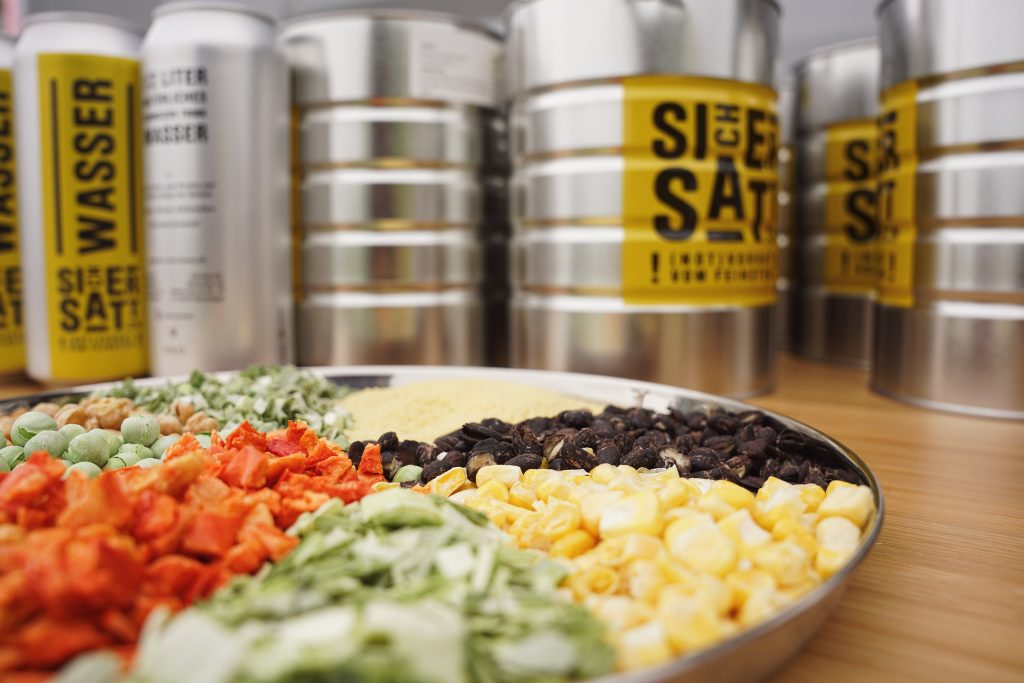We know from experience that among our customers there are the most diverse motivations and motives for keeping a stock of food. We at SicherSatt AG are deliberately politically and denominationally neutral and unbiased with regard to the personal convictions of our customers. We produce and sell long-lasting food of the best quality and thus want to help satisfy our customers’ need for food security.
What belongs in the emergency ration and when do I need it?
4. April 2024

In a rapidly changing world that can occasionally be affected by unpredictable events such as natural disasters or other emergency situations, it is wise to be prepared. An important part of any preparedness measure is the availability of emergency rations. These food supplies not only provide essential nutrition, but also safety and peace of mind during challenging times. In this blog post, we will take a closer look at the topic of emergency rations: Why they are important, what types there are and how best to prepare them for emergencies
What are emergency rations?
Emergency rations are specially compiled food supplies that are kept on hand in the event of crisis situations or emergencies. They are used to ensure nutrition when the usual supply options are not available or are restricted. These supplies are designed to have a long shelf life and ensure a balanced diet, even under difficult conditions such as natural disasters, power outages or other emergencies.
Emergency rations can come in a variety of shapes and sizes, depending on the needs and preferences of the individual or family. Typical emergency rations include dry food, canned food, energy bars, dehydrated meals, and other shelf-stable foods. These foods are often packaged in special packaging or containers that protect them from moisture, light and other environmental influences and extend their shelf life.
What belongs in the emergency rations?
Emergency rations, also known as survival rations or emergency food, are specially designed food products intended for use in emergency situations. They are designed to provide a balanced diet and meet the body’s basic nutritional needs even when conventional food sources are unavailable. Here are some typical contents of emergency rations:
- Dry Foods: Emergency rations often include dry foods such as biscuits, crackers, bread, or granola bars. These foods have a long shelf life and are easy to store, making them ideal for use in emergency situations.
- Canned Goods: Canned foods like tuna, beans, vegetables, or fruits are also common components of emergency rations. They have a long shelf life and contain important nutrients such as proteins, carbohydrates, vitamins, and minerals.
- Dried Fruits and Nuts: Dried fruits and nuts are high-energy foods that may be included in emergency rations. They provide essential nutrients and are easy to transport and consume.
- Energy Bars and Granola Bars: Energy bars and cereal-based bars are popular components of emergency rations. They are rich in carbohydrates and proteins and serve well as snacks or quick energy sources in emergency situations.
- Beverage Powders: Some emergency rations also include beverage powders that can be mixed with water to prepare instant drinks such as fruit juices, tea, or soups. These beverages provide hydration and essential electrolytes to keep the body hydrated.
- Vitamins and Minerals: Some emergency rations also contain supplementary vitamins and minerals to ensure that all the body’s nutritional needs are met during an emergency situation.
The selection and composition of emergency rations may vary depending on the manufacturer and product. It is important to choose emergency rations that provide a balanced diet and consider individual needs and preferences. In the event of an emergency, emergency rations should be regularly checked and, if necessary, renewed to ensure that they are still edible and shelf-stable.
Why are emergency rations important?
The significance of emergency rations lies in their potential to serve as life-saving resources when access to fresh food is restricted or interrupted. In disaster situations where supply chains are disrupted or evacuations become necessary, emergency rations can help meet nutritional needs and ensure survival. They provide a reliable and long-lasting source of food that can be crucial in critical moments.
Emergency rations are important in:
- Natural Disasters: During natural disasters such as hurricanes, earthquakes, floods, or wildfires, supply routes can be severed. Emergency rations are indispensable in such cases to provide affected populations with vital nutrients until normal supply is restored.
- During prolonged power outages or other technical disruptions that may affect food supply.
- Civil Defense Measures: In times of heightened civil defense alertness due to political unrest, terrorist threats, or other public security risks, emergency rations can serve as preparation for potential supply shortages.
- Outdoor Activities and Adventure Travel: During camping, hiking, mountaineering, or other outdoor activities, unforeseen situations may arise that impede access to food. Emergency rations offer a reliable solution to supply oneself in such situations and minimize potential risks.
- Economic Instability: In economically uncertain times, such as hyperinflation, currency crises, or unemployment, emergency rations can help ensure food security and reduce the need for expensive foods.
- Pandemics and Health Crises: During outbreaks of infectious diseases or pandemics, such as the COVID-19 pandemic, emergency rations can help support physical distancing and reduce the need for frequent shopping trips.
The importance of emergency rations lies in ensuring a reliable supply of essential nutrients in emergency situations. They can help increase survival chances, maintain health, and minimize hardships during crises. Through timely preparation with emergency rations, people can better respond to unexpected challenges in critical situations and protect themselves and their families.

How do I create an emergency ration for my home?
Creating an emergency supply for home is an important precautionary measure to be prepared for unforeseen emergency situations. Here are some steps to create an emergency supply for home:
- Assessing needs: Consider the number of people in the household, special dietary needs, allergies, and preferences when assembling the emergency supply.
- Selecting durable foods: Choose foods that have a long shelf life and require little or no refrigeration. This includes dry products such as cereal, nuts, canned goods, dried fruits, cookies, and energy bars.
- Ensure variety: Ensure that your emergency supply provides a variety of nutrients and flavors to ensure a balanced diet and avoid monotony.
- Water: Store enough water for emergencies. Experts recommend storing at least one liter of water per person per day for at least three days.
- Storage: Store your emergency supply in a cool, dry, and dark place protected from sunlight, moisture, and pests. Use airtight containers or vacuum packaging to extend the shelf life of the food.
- Review and update: Regularly review your emergency supply to ensure that the food is still edible and durable. Replace consumed or expired products in a timely manner.
- Emergency kit: Ensure that your emergency supply is easily accessible and that all household members know where it is located. Supplement your emergency supply with other important items such as flashlights, batteries, first aid supplies, and important documents if necessary.
By creating an emergency supply for home, you can prepare for unexpected emergency situations and ensure that you and your family are adequately provided for during crises. It is important to note that the actual shelf life of emergency supplies depends on various factors, including storage conditions (temperature, humidity, light), the type of packaging, and the quality of the food. It is advisable to regularly check the shelf life of emergency supplies and replace consumed or expired products as needed to ensure that your emergency preparedness is always ready for action.
Conclusion
Emergency rations are an important precautionary measure to prepare for unforeseen situations such as natural disasters, emergencies or crises. They provide a reliable and practical way to ensure a balanced diet and support survival in times of need. By selecting a diverse range of foods, checking expiration dates, storing appropriately and rotating supplies regularly, emergency rations can be used effectively. It is important to take these measures to protect yourself and your family in emergency situations and to be prepared for unexpected events.

